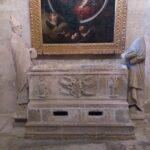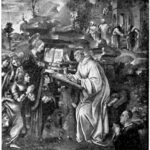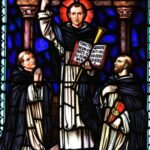St. Andrew the Apostle
St. Andrew the Apostle
When he lived: St. Andrew, the patron saint of Scotland, lived during the 1st century AD.
Where he lived: St. Andrew hailed from the picturesque region of Galilee in ancient Israel.
Notable world events during the time of his life:
- The Roman Empire’s Expansion: St. Andrew’s lifetime coincided with the rapid expansion of the Roman Empire, which was actively conquering new territories, including parts of Europe, Asia, and Africa. This era witnessed the rise of prominent Roman emperors such as Augustus, Tiberius, and Caligula.
- The Crucifixion of Jesus Christ: One of the most significant events during St. Andrew’s time was the crucifixion of Jesus Christ. As one of Jesus’ twelve apostles, St. Andrew was witness to his teachings, miracles, and ultimately, his crucifixion and resurrection. This event had a profound impact on the development of Christianity.
- The Great Fire of Rome: In AD 64, a catastrophic fire broke out in Rome, which destroyed a significant portion of the city. This event led to the persecution of Christians, including St. Peter and St. Paul, who were both martyred during this period.
- The Jewish-Roman War: From AD 66 to 73, the Jewish-Roman War raged in the province of Judea, resulting in the destruction of the Second Temple in Jerusalem. This conflict had far-reaching consequences for both Jews and early Christians and influenced the spread of Christianity beyond the Jewish community.
- The Mount Vesuvius Eruption: In AD 79, the infamous eruption of Mount Vesuvius buried the cities of Pompeii and Herculaneum under layers of volcanic ash. This natural disaster had a significant impact on the Roman world, preserving these ancient cities in remarkable detail and providing valuable insights into Roman culture and daily life.
- The Construction of the Colosseum: During St. Andrew’s lifetime, construction of the Colosseum, also known as the Flavian Amphitheater, began in Rome. This magnificent structure, completed in AD 80, became an iconic symbol of Roman engineering and hosted thrilling gladiatorial contests and other spectacles.
His patronage: St. Andrew is widely recognized as the patron saint of Scotland, where he is celebrated on St. Andrew’s Day, observed on November 30th. He is also the patron saint of fishermen, rope-makers, singers, spinsters, and women who wish to become mothers. Additionally, he is revered as the patron of Greece, Russia, Ukraine, and many other countries. St. Andrew’s influence extends beyond his patronage, as he is considered one of the foremost apostles and a revered figure in the Christian faith.
Following the Lamb of God
There is no existing account of the early life of St. Andrew, one of the Twelve Apostles. He was the brother of Simon, who was called “Peter” by the Lord later on. The Synoptic Gospels (Matthew, Mark, and Luke) tell that he and Peter were called by Jesus to the Sea of Galilee. Jesus called them from their fishing and told them that they would become “fishers of men”. The Gospels recount that from that time on, they left their nets and boats and followed Jesus.
The Gospel of John presented a rather different version of Andrew’s encounter with Jesus. In this gospel, Andrew is the first apostle named. Like many faithful Jews of his time, he was waiting for the Messiah sent by God. Andrew was a disciple of John the Baptist before he was called by Jesus. One day, he heard John the Baptist proclaiming Jesus as “the Lamb of God” (John 1:36). After hearing these words, Andrew was stirred, and with another unnamed disciple, he followed Jesus. The evangelist says that “they saw where he was staying, and they stayed with him that day.” (John 1:37–39).
Andrew in the Gospels
The Gospels mention the name Andrew on three occasions. The first was the multiplication of loaves in Galilee. When they saw a very large crowd of people following them, it was Andrew who pointed out to Jesus about the young boy who had five barley loaves and two fish, with the remark that they were not much for the multitudes who had gathered in that place (see John 6:8–9).
The second occasion was in Jerusalem, when a disciple drew Jesus’ attention to the sight of the massive structure of the Temple. Jesus’ response was rather surprising and unpredicted: “Do you see these great buildings? There will not be one stone left upon another that will not be thrown down.” Then Andrew, together with Peter, James, and John, asked him: “Tell us, when will this happen, and what sign will there be when all these things are about to come to an end?” (see Mark 13:1–4).
Lastly, in Jerusalem, shortly before Jesus’ passion, some Greeks had come to the city for the Passover. These Greeks, probably proselytes or simply God-fearing men who had come to worship the God of Israel, approached Philip with the request, “Sir, we would like to see Jesus” (see John 12:20–23). Andrew and Philip served as interpreters and mediators for this small group.
Andrew’s Missionary Journey
After Jesus’ Resurrection and Ascension, the Acts of the Apostles recount that Andrew and his other companions went to Jerusalem and waited for the promised Holy Spirit. The rest of Andrew’s life could be found in apocryphal and non-canonical texts. Christian writers of the first centuries wrote that Andrew went to evangelize Asia Minor and the regions along the Black Sea until he reached the Volga.
Andrew tirelessly preached the Good News throughout Achaea and in Patras around the year 60. He was martyred there and crucified on an X-shaped cross. According to legend, Andrew’s last words were: “Cross, sanctified by the body of Christ. Good Cross, long desired always, I loved you and wished to embrace you. Welcome me and bring me to my master.” His feast day is November 30.
Five Interesting Facts About St. Andrew the Apostle
- St. Andrew’s name was of Greek origin. His name means “manly”.
- Dependent on John 1:40, early Byzantine tradition calls St. Andrew “protokletos,” which means “first called.”
- According to legend, it was St. Andrew himself who requested that he be crucified on an X-shaped cross as a way to evoke the Greek initial used for the name of Christ.
- St. Gregory of Tours recorded in his book an annual miracle at St. Andrew’s tomb in the sixth century. He recounted that the Apostle worked a great miracle: manna with the appearance of flour and oil with the fragrance of nectar overflowed from his tomb. In this way, the fertility of the coming year was revealed.
- A legend says that St. Andrew healed Maximilla, wife of the governor of Patras. Andrew’s preaching and miracles enlightened nearly all citizens of Patras with the true faith.
Prayer to St. Andrew the Apostle
We humbly implore your majesty, O Lord, that, just as the blessed Apostle Andrew was for your church a preacher and pastor, he may be for us a constant intercessor before you. Through our Lord Jesus Christ, your Son, who lives and reigns with you in the unity of the Holy Spirit, one God, for ever and ever Amen.



